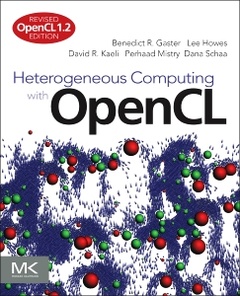Description
Heterogeneous Computing with OpenCL (2nd Ed.)
Revised OpenCL 1.2 Edition
Authors: Gaster Benedict, Howes Lee, Kaeli David R., Mistry Perhaad, Schaa Dana
Language: English
Subjects for Heterogeneous Computing with OpenCL:
69.52 €
In Print (Delivery period: 14 days).
Add to cart308 p. · 19x23.3 cm · Paperback
Description
/li>Contents
/li>Readership
/li>Biography
/li>Comment
/li>
Heterogeneous Computing with OpenCL, Second Edition teaches OpenCL and parallel programming for complex systems that may include a variety of device architectures: multi-core CPUs, GPUs, and fully-integrated Accelerated Processing Units (APUs) such as AMD Fusion technology. It is the first textbook that presents OpenCL programming appropriate for the classroom and is intended to support a parallel programming course. Students will come away from this text with hands-on experience and significant knowledge of the syntax and use of OpenCL to address a range of fundamental parallel algorithms.
Designed to work on multiple platforms and with wide industry support, OpenCL will help you more effectively program for a heterogeneous future. Written by leaders in the parallel computing and OpenCL communities, Heterogeneous Computing with OpenCL explores memory spaces, optimization techniques, graphics interoperability, extensions, and debugging and profiling. It includes detailed examples throughout, plus additional online exercises and other supporting materials that can be downloaded at http://www.heterogeneouscompute.org/?page_id=7
This book will appeal to software engineers, programmers, hardware engineers, and students/advanced students.
- Introduction to Parallel Programming
- Introduction to OpenCL
- OpenCL Device Architectures
- Basic OpenCL Examples
- Understanding OpenCL's Concurrency and Execution Model
- Dissecting a CPU/GPU OpenCL Implementation
- Data Management
- OpenCL Case Study: Convolution
- OpenCL Case Study: Histogram
- OpenCL Case Study: Mixed Particle Simulation
- OpenCL Extensions
- Foreign Lands: Plugging OpenCL In
- OpenCL Profiling and Debugging
- Performance Optimization of an Image Analysis Application
Software engineers, programmers, hardware engineers, students / advanced students
Lee Howes has spent the last two years working at AMD and currently focuses on programming models for the future of heterogeneous computing. Lee's interests lie in declaratively representing mappings of iteration domains to data and in communicating complicated architectural concepts and optimizations succinctly to a developer audience, both through programming model improvements and education. Lee has a Ph.D. in computer science from Imperial College London for work in this area.
David Kaeli received a BS and PhD in Electrical Engineering from Rutgers University, and an MS in Computer Engineering from Syracuse University. He is the Associate Dean of Undergraduate Programs in the College of Engineering and a Full Processor on the ECE faculty at Northeastern University, Boston, MA where he directs the Northeastern University Computer Architecture Research Laboratory (NUCAR). Prior to joining Northeastern in 1993, Kaeli spent 12 years at IBM, the last 7 at T.J. Watson Research Center, Yorktown Heights, NY.
Dr. Kaeli has co-authored more than 200 critically reviewed publications. His research spans a range of areas including microarchitecture to back-end compilers and software engineering. He leads a number of research projects in the area of GPU Computing. He presently serves as the Chair of the IEEE Technical Committee on Computer Architecture. Dr. Kaeli is an IEEE Fellow and a member of the ACM.
Perhaad Mistry works in AMD’s developer tools
- Explains principles and strategies to learn parallel programming with OpenCL, from understanding the four abstraction models to thoroughly testing and debugging complete applications.
- Covers image processing, web plugins, particle simulations, video editing, performance optimization, and more.
- Shows how OpenCL maps to an example target architecture and explains some of the tradeoffs associated with mapping to various architectures
- Addresses a range of fundamental programming techniques, with multiple examples and case studies that demonstrate OpenCL extensions for a variety of hardware platforms




